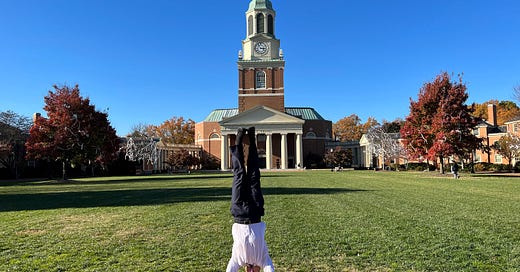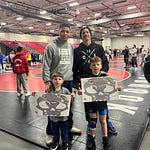🔥Welcome to Volume #00075!🔥
I’m Christian Champ. This is ☯️The Middle Way Newsletter ☯️. It is a place where I write, explore, share, and invite you along for the journey.
If you enjoy the newsletter please share it with your friends.
Please follow The Middle Way on Instagram and Twitter.
I’m also currently writing a daily atomic essay here.
🤝8 Ways to Become Home Grown Humans Through Our Daily Actions and Choices🤝
One of my teachers, Jamie Wheal, founder of the Flow Genome Project, came up with the idea of becoming Home Grown Humans.
He wants us to become "grown-ass adults" in how we conduct and live our lives.
How do we go about unlocking our home grown humanness in a world that presses us in the opposite direction?
8 Ways For Us to Do it With Our Actions and Choices
1. Do we show up in a generative manner for our culture, and our current and future relatives?
Are we playing for me, we or thee? We need to play for all three.
Do we remember that our words matter?
2. Do we make things better when we are involved?
Are we showing up with that positive energy that adds to the mix or are we subtracting from the process?
We need to give good energy and take the group to new places.
3. Do we keep showing up when things are hard?
Are we leaning into the challenges and the pain points to get through them?
We need to keep going and not quit.
4. Do we help others?
Are we looking for those who are down and pulling them up?
We need to go out of our way to bring goodness into the world.
5. Do we build things?
Are we moving the world beyond where we stand today and paying it forward by building and creating?
We need to help create and build the beautiful now and tomorrow.
6. Do we engage in serious play?
Are we playing like the world depends on us and playing to open up possibilities and alternatives?
We need to play without judgment, trying on identities and ways of looking at the world to find that better future.
7. Do we play Infinite Games?
Are we playing games where the point of the game is to keep playing?
We need to exit finite games like money and status and play to keep playing.
8. Are we grateful for the journey, the moments, and what we have?
Being grateful is what life is about. It gives us peace, it makes our lives better, and we become better people when we show gratitude.
It’s the perfect life flywheel.
The process of becoming homegrown never ends. We need to tend to our lives like a garden, respecting that weeds grow and we need to pick them. Things are never perfect and always evolving.
Life at times is easy and we hit all eight points on the list. Other times we get thrown around in a whirlpool and just keeping our head above water becomes the goal.
Every day we try to become a little more home grown.
📓Things to Think About📓
The Father of Flow Passes Away
It’s been a rough year for mentors who I never met, whose ideas helped transform my life. First, we lost James Carse, who penned the idea behind infinite games. Now we lost the father of flow, Mike Csikszentmihalyi.
He unlocked ideas on how to be a homegrown human, find lots of flow, and then offered a simple-to-follow recipe. He walked the talk and lived the life he encouraged others to lead.
Often known as Mike C. to friends and colleagues, Csikszentmihalyi (pronounced Chick-SENT-Me-High) once wrote that the best moments in life are not the passive, receptive or relaxing times. By that logic, he undoubtedly counted many great moments in his lifetime, authoring numerous books and holding countless titles—not least among them husband, father and grandfather.
“Since his death, so many people have talked about Mike's impact as a person—alongside talking about his impact as a scholar—appreciating his humor, warmth, and generosity,” said Nakamura, co-director of the Claremont Graduate University’s Quality of Life Research Center, which Csikszentmihalyi founded. “He was the best example of the things that he studied about the life well lived.”
Do Real Things by Brad Stulberg
When we do real things we connect with ourselves and the world around us. They drive deep embodiment because they challenge us and push us to fully commit to the task at hand.
It’s like the rap lyrics “real players do real things”. We want to be players in life and to do that we need to do real things.
Lifting weights helps keep you grounded.
Weight lifting, of course, is just one of many activities in the real world that can help keep you from losing touch with reality. Cycling, swimming, gardening, hiking, and climbing are all just a few other examples of activities that can help you stay grounded.
In researching and reporting my new book, The Practice of Groundedness, I came across a common theme among peak performers who are also grounded: they regularly do real things that are hard, and as a result, they regularly practice humility and gain deep and lasting fulfillment.
Lisa Feldman Barrett on the need to Re-Write Emotional Intelligence
She breaks down the power of words and vocabulary to increase our emotional granularity (the more options we have for a potential emotional, the better our guess at understanding that emotional response).
Instead of perceiving someone as generically “glad,” learn to distinguish more specifics. Are they “overjoyed” or “contented” or “grateful?” Are they “angry” or “indignant” or “resentful” or “bitter?” More fine-grained emotions allow your brain to prepare for an array of different actions, whereas more generic emotions (angry, glad) confer less information and restrict your flexibility.
The idea that you can increase your emotional intelligence by broadening your emotion vocabulary is solid neuroscience. Your brain is not static; it rewires itself with experience. When you force yourself to learn new words—emotion-related or otherwise—you sculpt your brain’s microwiring, giving it the means to construct those emotional experiences, as well as your perceptions of others’ emotions, more effortlessly in the future. In short, every emotion word you learn is a new tool for future emotional intelligence.
🎧Things to Listen, See, and Watch 🎧
The Great Resignation or the Great Awakening in Healthcare?
Dr. Zubin Damania breaks down all the issues with healthcare and why healthcare workers are exiting.
Poorly designed systems continue to break, can we recreate new ones that work better and serve everyone?
Healthcare sucked for workers before Covid → They were burnt out and no one did anything for them and COVID made it way worse
Health 2.0, the product is a patient and you are paid to do things to them, not for them
You are miserable because work is omnipresent, unenjoyable and you can’t even be happy at home
We are given pizza to deal with chaos and crazy patients (who don’t know better)
Some places have the right leadership, but most places don’t
Healthcare workers burn out because they can’t do the work to help the patient, as more people leave, their job gets worse
His wife is a Stanford doctor, drives to the gym and finds out the healthcare workers free parking spaces are now gone and it cost $75 for a monthly parking pass —> This is the leadership that is running the healthcare system
They ask him how to improve a system that sees people leaving, making it worse… he tells them “try not to suck”
We need to start with reforming ourselves and look inwards towards the words leadership uses such as Well Being, Burn Out, Health, making them mean something instead of throw away words. Making it all garbage
Running medicine as a business model is not how you can treat a caring art
You need to do well by doing good, not the fragile system we have
We lost compassion for people that are afraid of the vax, how is that working out?




💣Words of Wisdom💣
Robin Wall Kimmer, Braiding Sweetgrass: Indigenous Wisdom, Scientific Knowledge and the Teachings of Plant-
“What is the duty of humans? If gifts and responsibilities are one, then asking “What is our responsibility?” is the same as asking “What is our gift?” It is said that only humans have the capacity for gratitude. This is among our gifts.”
Robin Wall Kimmer, Braiding Sweetgrass: Indigenous Wisdom, Scientific Knowledge and the Teachings of Plants -
“Paying attention is a form of reciprocity with the living world, receiving the gifts with open eyes and open heart.”
Kevin Kelly, The Inevitable -
"Endless Newbie is the new default for everyone, no matter your age or experience."
Sam Sheridan, A Fighter's Heart -
"By doing something repeatedly, though, and understanding it, you can diffuse and defuse the fear. This is true for sailing, riding motorcycles, asking girls out—even getting hit in the face by a man who wants to kill you."
Italo Calvino, Invisible Cities -
"Arriving at each new city, the traveler finds again a past of his that he did not know he had: the foreignness of what you no longer are or no longer possess lies in wait for you in foreign, unpossessed places."
Frank Ostaseski, The Five Invitations -
"We become aware of the fundamental truth that everything comes and goes: every thought, every lovemaking, every life. We see that dying is in the life of everything. Resisting this truth leads to pain."
🙏Thanks for reading🙏
How do you become a more homegrown human? What do you need to start or stop doing to accomplish this?
Happy Thanksgiving!
I’m grateful for everyone that reads the newsletter.
Any thoughts or comments, please share!
Namaste,
Christian
Doing meetings in Winston-Salem means you stop by your old college campus (Wake Forest) all dressed up to do a handstand.
















Share this post